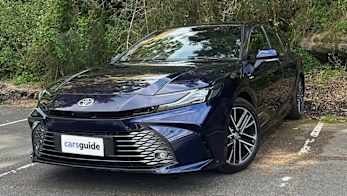MG has revealed its flagship seven-seat SUV overseas.
The model arrives in middle eastern markets ahead of an Australian launch expected in 2025. The new large SUV is an MG-branded version of the Roewe RX9 sold in China from MG’s premium sister brand.
In Australia, MG has made no secret of the fact that it is imminently looking to introduce a large SUV to sit above the HS mid-sizer in its current line-up. CarsGuide understands the RX9 will be badged the QS in Australia in keeping with the more simple two-character naming convention it uses for its SUV range.
This new seven-seat SUV is powered by a 2.0-litre turbocharged four-cylinder petrol engine producing 150kW/350Nm that is mated to a ZF-sourced nine-speed torque converter automatic transmission as opposed to the usual dual-clutch set-up used in MG combustion cars.
There is no hybrid variant, but the UAE-market versions are available in either front-wheel drive or all-wheel drive.
Overseas specs have the RX9 complying with Euro6b regulations, short of the strict Euro6d-equivalent required in Australia to fly clear of the incoming new vehicle emissions laws in force from January 2025.
.jpg)
MG will have a low enough fleet average thanks to its hybrids and electric vehicles to off-set the RX9/QS in its current form.
Measuring at 4983mm long by 1967mm wide and 1786mm tall, the RX9/QS is slightly larger than its popular rivals like the Kia Sorento and Hyundai Santa Fe, even slightly eclipsing the Toyota Kluger in length.
The MG-badged version of the RX9/QS almost matches its Roewe equivalent in China, with MG badges perched atop the bonnet and tailgate in place of the wordy Chinese domestic badging, while the interior drops the tri-screen dash from the Chinese market in favour of a more traditional dual-screen layout (for the multimedia touchscreen and digital instrument cluster), as well as an MG-branded steering wheel familiar to the kind in the current MG4.
.jpg)
Features available in middle eastern markets include massive 20-inch alloy wheels (21-inch wheels on the top-spec), LED headlights, dual 12.3-inch screens for the digital instrument cluster and multimedia screen, wired Apple CarPlay and Android Auto connectivity, eight- or 12-speaker audio, cloth or leather seat trim, tri-zone climate control, a powered tailgate, and a 360-degree parking camera.
A wireless phone charger and auto dimming rear vision mirror are available on high grades, alongside a full suite of active safety equipment like auto emergency braking, lane keep aids, adaptive cruise, and blind spot monitoring, which would have to be standard equipment in Australia.
Pricing starts from the equivalent of AU$40,000 in the Middle East, although expect a higher standard spec in Australia and a correspondingly higher price. Its smaller HS sibling currently tops out at $40,990 locally.
Expect to learn more about MG’s 2025 model range imminently. The ZS small SUV will be followed up by an electric spin-off replacement for the ZS EV (overseas dubbed the MG ES5), and MG’s local division also has designs on the Camry-rivalling MG7 sedan which is also already available in China and the Middle East. A recent update brings a limited-slip differential to the sharply-styled model in the Chinese market, however the local MG arm has said it’s seeking as many hybrid options as it can get its hands on.
It is also seeking an MG-badged version of the premium fully electric IM Motors L6 sedan (another SAIC sub-brand), one that will allegedly receive a semi solid-state battery imminently.
Finally, as part of the brand’s ambitions to offer a vehicle in every segment, it is also working on sourcing a new ute model, which may be significantly different from the LDV eTerron 9 offered by its commercial sister company in Australia.
.jpg)
Now having conquered a secure spot in Australia’s top-10 automakers, the Shanghai-backed MG has its sights set on a top 5 position, but will face stiff competition in 2025 and 2026 as more than ten new automakers from China aim for a slice of its success.





.jpg)

.jpg)

.jpg)

.jpg)
.jpg)

.jpg)
.jpg)


.jpg)

_0.jpg)

.jpg)
.jpg)
.jpg)
.jpg)
.jpg)
.jpg)
.jpg)




